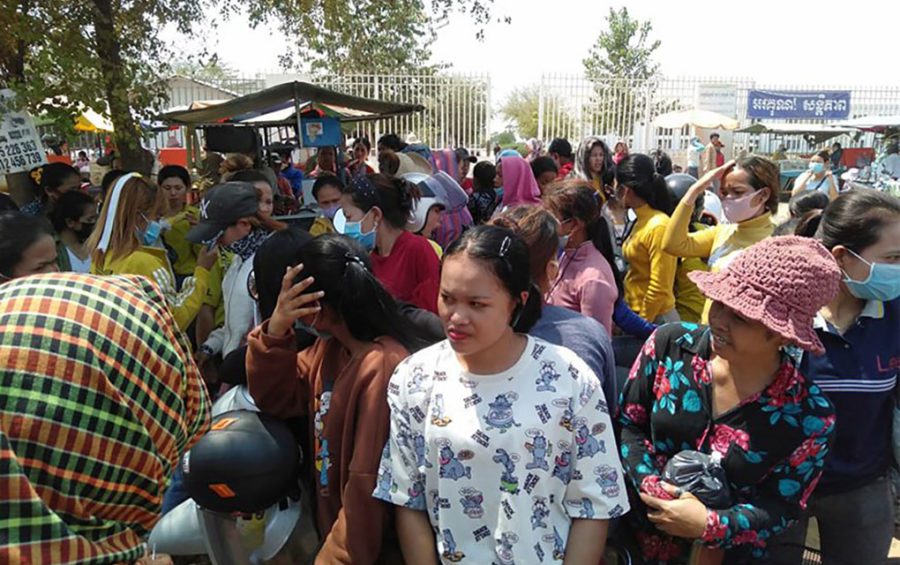Workers at a Kampong Speu shoe factory protested on Thursday, accusing the owner of suspending them from work without agreeing to pay partial salaries as companies would be required to according to Prime Minister Hun Sen.
Meanwhile, financial institutions have been quiet about if and how they will offer any form of debt relief to borrowers left with diminished salaries due to Covid-19-related work suspensions, after the premier suggested measures to ease the burden on borrowers earlier this month.
Yu Ravy, a protesting Jacka Shoes factory worker, told VOD that about 200 laborers rallied after their jobs were suspended without compensation, even though the government has said workers should receive 60 percent of their base pay if they are suspended due to the novel coronavirus-linked economic slowdown.
Another approximately 1,000 workers still have jobs, but the factory suspended an additional 100 employees on Friday and would likely suspend more, said Soy Chanthou, president of the Federation Union of Free and Independent, which is monitoring the dispute.
Ravy said workers were told on Monday that the factory would suspend them from Thursday. The company did not tell workers the length of the suspension, she said.
“If the suspension lasts between one or two years, what will I have to support my livelihood?” the factory worker said. “We only depend on Samdech [Prime Minister Hun Sen] to help us get the 60 percent because we got nothing when this factory suspended operations.”
A factory representative could not be reached for comment.
Last month, Hun Sen announced a range of initiatives intended to shore up the garment industry as the Covid-19 pandemic continues to hit the global economy hard.
If a factory suspends operations, the company must pay 40 percent of workers’ minimum wages and would not have to pay into the National Social Security Fund, the prime minister said. The government would pay another 20 percent of workers’ salary, and employers should suspend rather than end contracts due to material supply shortages, he added.
“I would like to appeal to factories, please do not take suspension [of production] as a chance to terminate workers’ contracts,” Hun Sen said earlier. “This is something that we have to avoid while workers are facing difficulties.”
Last month, the Finance Ministry also extended a tax holiday to garment and footwear factories for six months to a year for any severely impacted by supply chain disruptions or the impending partial suspension of E.U. trade perks.
Chanthou, the union leader, said he’s especially worried about pregnant workers at Jacka Shoes, who would lose their maternity benefits if their contract is suspended.
“It is an injustice to workers. All levels of authorities have to take action against this factory,” the unionist said.
Cheok Borin, director of the Kampong Speu Provincial Labor Department, said he was working with the company and workers to mediate the dispute.
“We are discussing to find a solution, but I can’t yet say what the result might be,” Borin said.
Last week, the Labor Ministry said 54 factories had submitted requests to suspend production, which would cost approximately 28,000 workers their jobs. Another 200 factories are lacking raw materials, putting more than 160,000 workers’ jobs at risk, the ministry said.
About 1,000 workers protested at a Phnom Penh garment factory this week after the company said it could not pay employees their full salaries due to a decline in payments from buyers during the ongoing economic slowdown.
The Health Ministry has confirmed 103 Covid-19 cases in Cambodia, including 11 people who have recovered as of Friday, according to a ministry report released by the American Chamber of Commerce in Cambodia.
Covid-19’s impact on Cambodia’s GDP may be more than 1 percent of GDP in the best-case scenario and nearly 3 percent of GDP in a worst-case scenario, according to an Asian Development Bank briefing from earlier this month.
Keo Theara, who has worked at Jacka Shoes for five years, said she will struggle to pay her family’s expenses and her loans without an income.
“I am very worried and fear that I won’t have money to spend,” Theara said. “I was suspended from work without a single riel, and I owe the bank a lot.”
More factories are beginning to suspend operations, but financial institutions that provide loans to many garment workers have yet to announce if and how they will aid workers left with a smaller income.
Earlier this month, Hun Sen said banks and microfinance institutions (MFIs) should help relieve financial strain on workers with suspended contracts by exempting them from paying interest and allowing delayed payments.
The Association of Banks of Cambodia and the Cambodia Microfinance Association (CMA) has signaled their support for recommendations from the National Bank of Cambodia, including exercising “flexibility in dealing with issues about loan repayment of customers” impacted by Covid-19.
Heng Koy, general manager of the banks’ association, told VOD on Thursday that banks and MFIs are still considering how to mitigate impacts on workers who are managing a loan with a suspended work contract.
When asked how many borrowers might be given exemptions on paying interest or offered a pause on loan repayments, Koy said he could not confirm yet.
“In relation to the time and specific target groups, I will continue to give updates because it is a technical matter. We are working on this,” he said.
Phal Vandy, CMA’s executive director, could not be reached for comment.
Additional reporting by Ouch Sony
(Translated and edited from the original articles on VOD Khmer)













